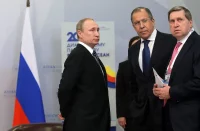The most interesting outcome of the last BRIC Summit was the agreement to boost cooperation on the use of local currencies in trade transactions. The agreement between banks in Russia, India, China and Brazil that service import-export operations is intended to measure trade directly in national currencies. This is an interesting development, and it is a step on the road towards toppling the dollar and enhancing the role played by the financial and monetary systems of those countries, among other things. Almost half the world’s population lives in the BRIC countries, and in terms of real GDP they account for almost a third of the world’s total. Even more interestingly, their share is growing rapidly, while the share of the traditional Western leaders has been steadily declining. Seen from this perspective, it is clear where things are going.
America would suffer if China did not buy American securities.
But think about it: the BRIC countries have decided to make their currencies inter-convertible. How will they calculate conversion rates? In parrots, perhaps? The entire system is currently based totally on dollars. All of the BRIC countries are terribly dependent on the American dollar system, although to varying degrees. Yes, they are concerned about this dependence and about the dollar’s decline. At the same time, they live within the system, and they are an important component of it. If China did not buy American securities, America would suffer. If America suffers, China would have nowhere to sell their goods. And Russia would be unable to get adequate prices for its energy commodities.
All of these countries accumulate and hold enormous dollar reserves. Ever since the Asian crisis, countries have felt that this is the only way of protecting themselves against shocks that can destabilize their financial systems. While accumulating dollar reserves, they are also concerned with holding onto them. BRIC members certainly may show their displeasure with the United States and its role in the global financial decision making system. But the point is that those decisions are not made even by the developed countries. There is one financial regulator in the world—the United States. And there can be no other regulator within that system because changing the regulator would destroy the system.
That means there is only one way to avoid the regulator—withdraw from the system. That would be revolutionary—a financial, economic and geopolitical revolution. Perhaps even a military revolution. Another option would be to wait until the system breaks down, because it is moving in that direction by leaps and bounds. Then they will be able to extricate themselves from it, at the risk of collapsing along with it. And those are the two options. Nobody dares withdraw. But the system is breaking down whether the BRIC nations want it or not, whether they are aware of it or not. They can neither prevent the collapse nor speed the process up. They are unable to make a decision.
It has been reported that the Chinese government is considering the possibility of allowing the yuan to trade against other currencies. Not just against the dollar, but against the ruble, the South Korean wan and the Malaysian ringgit. But do they want to turn the yuan into a convertible currency and make it a direct competitor to the dollar instead of accumulating dollar reserves? They do not. In fact, they cannot. Their dependence on the American market and the system of financial instruments denominated in dollars is simply enormous. Of course, we can also trade with the Mongols in our national currencies. The Chinese are already trading with them. Why not?
Mikhail Leontyev is a prominent Russian TV journalist and commentator, Editor-in-Chief of Odnako(However) magazine, author of several political analysis programs.














Another parameter must be considered with regard to the status of any international currency what currency is used in the raw materials and commodity trades; hence, especially, the health of the marriage between Oil and Dollar (Petro-Dollar) must be followed to say anything about the future.
Pingback: Why the Fed will eventually trigger global inflation? « ROUTE MAGAZINE